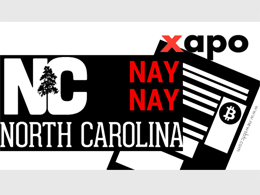
Bitcoin Provisions in the North Carolina Money Transmitter Act
The North Carolina Money Transmitter Act was recently extended to cover bitcoin traders with House Bill 289, signed in July 2016 by State Governor Pat McCrory. Deemed as the ‘virtual currency law’ in the state, the bill introduces a legal framework for regulating bitcoin and blockchain technology. While the legislation had to go through an elaborate and long discussion period, including the feedback of various stakeholders, the bill is seen today as business-friendly by many. It brings legal clarity in the field of virtual currencies in North Carolina, but does not open venues for....
Related News
North Carolina has carved out regulatory exemptions for select bitcoin and blockchain businesses in a move industry supporters say avoids problematic provisions in place in other US states. In a substantial update to its money transmitter FAQ page, the North Carolina Office of the Commissioner of Banks (NCCOB) has exempted digital currency miners; non-financial blockchain services; and multi-signature and non-custodial wallet providers from the state's Money Transmitters Act (MTA). Notably, the exemptions are the result of collaboration between the NCCOB and industry advocacy group the....
Following a majority vote of the North Carolina Senate, the General Assembly of the state has now approved the amendment of a statutory article – the North Carolina Money Transmitters Act. The move will see the term “virtual currency” added to the existing law. Bitcoin exchanges and other industry companies in North Carolina will now be mandated to obtain a money transmitter license following a vote by members of the North Carolina Senate. In May 2016, North Carolina state’s House of Representatives overwhelmingly voted in a 117-to-1 vote, seeking the update before the recent approval from....
Bitcoin services provider Xapo has confirmed that it will no longer operate in the state of North Carolina. The company, which recently moved its headquarters to Switzerland, cited state-level regulation as the decisive factor behind its decision. Earlier today, one North Carolina customer posted a message on Reddit stating that they had received a 30-day closure notice. Speaking to CoinDesk, Wences Casares, founder of Xapo, said: "It is correct that we are not operating in North Carolina. We do not have a money transmitter license in that state and we think the effort to comply with their....
Following the advance of North Carolina's revamped Money Transmitters' Act earlier this month, bitcoin services provider Xapo announced that it will no longer be operating in the state. The company cited state-level regulation as the main factor in their decision. The North Carolina Senate has already passed the bill covering bitcoin services regulation and is pending approval of the state's governor. Upon this, the bill would mandate minimum net worth requirement of $250,000 for applicants. Businesses would also be required to post a surety bond of $150,000, an amount subject to change....
The North Carolina Commissioner of Banks has released a document specifying in plain English what the virtual currency exemptions are according to its Money Transmitters Act (NC MTA): virtual currency miners. Blockchain 2.0 technologies; multi-signature software; and non-hosted, non-custodial wallets are generally not subject to the NC MTA. The clarification of its position on virtual currency comes at a time when most states have withdrawn from comment nearly altogether, in a wait-and-see-what-everyone-else-is-doing kind of approach. Or, in the case of New York, BitLicense has addressed....





